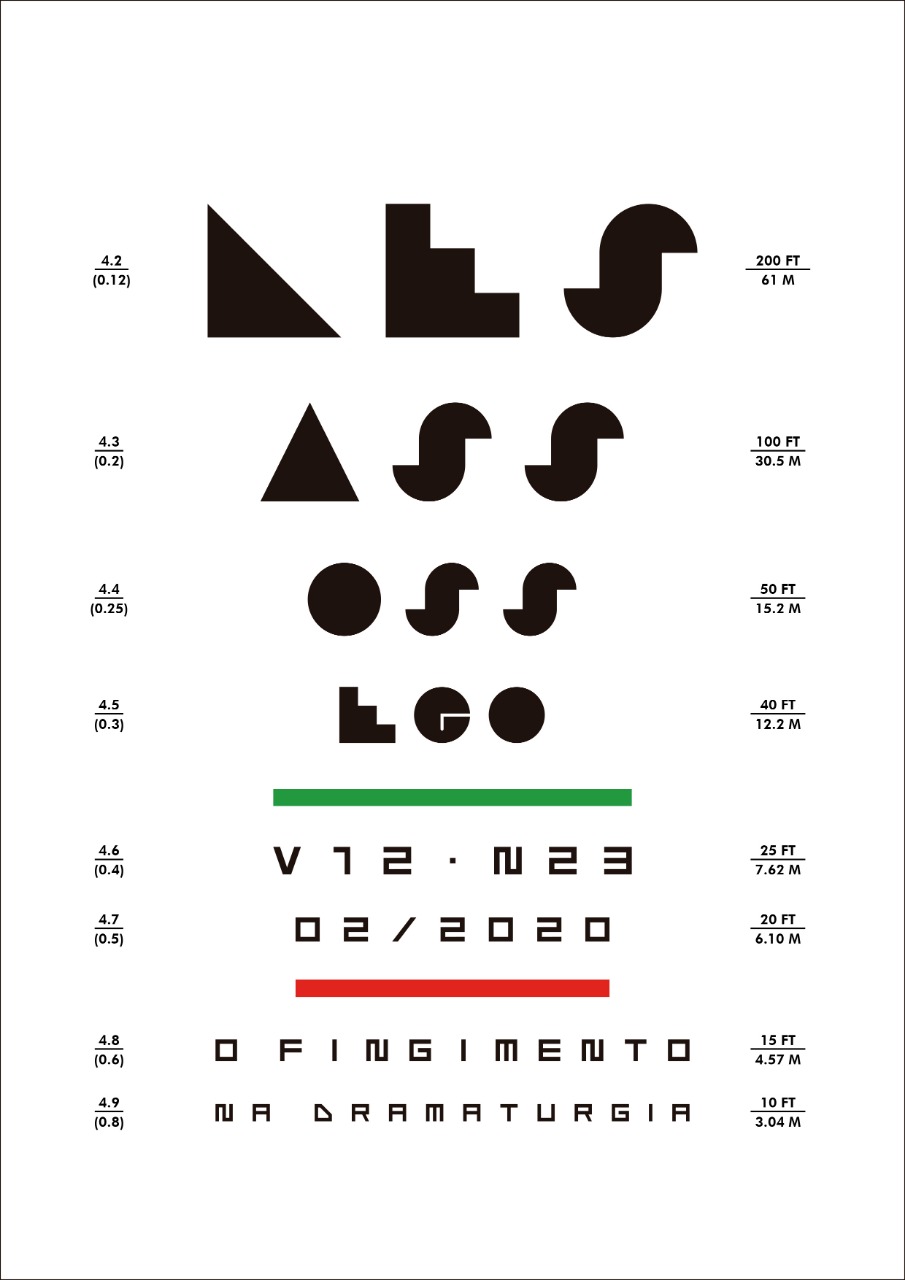The Doris' men: Bernardo Santareno and the act of making the sea a text to produce, to make sense
DOI:
https://doi.org/10.11606/issn.2175-3180.v12i23p41-62Keywords:
Bernardo Santareno, Sea, Production of senseAbstract
This work deals with the chronicles of Bernardo Santareno present in the work In the seas at the end of the world (1959) and his dialogism with the play O lugre (1959), by the same author. In the first, the author, dealing with mockery, focuses on personality (As peias do balance); storytelling, tradition and memory (Formerly). A trained psychiatrist, Santareno did not go unnoticed through humiliation (The fool), despair (The cyclone), discovery (Funeral maritime), hope (Frederikshaabs), superstition (The ghosts of Greenland; The werewolf) and anguish (The women of the toughest navigators in the world) evidenced in the social and personal condition of the characters, cod fishers in their majority, and those who are remembered by them, wives, daughters and friends. In each chronicle, the Santarem identification of dignity that elevates them from an apparent anti-heroism to the status of heroes. Heroes of resilience, overcoming and learning to be alone with themselves. Some, apprentices, unprepared to deal with love and death. Others, mature, facing, dozens of thimes, loneliness, perishing and fineness dozens of times in their cod-fishing ships. In the end, what they learned by being told to a doctor-writer who traveled with them. Once they are narrative nuclei that they are, these chronicles prepare the way for Bernardo Santareno to write the play O lugre (1959), a santarena reading of cod fishing not consistent with the course set by the Salazarist propaganda of that time. Treated, in their ambivalence, following this essay, in both, the exercise of confinement and social distance, with all the demands and consequences that both impose on the human condition.
Downloads
References
CRUZ, Valdemar. Cobaias de Salazar. In: <https://expresso.pt/sociedade/2017-06-18-Cobaias-de-Salazar> Acesso em 25 out 2020.
GARRIDO, Álvaro. O Estado Novo e as pescas: a recriação historicista de uma “tradição marítima nacional”. In: Torgal, Luís Reis; Paulo, Heloísa. Estados autoritários e totalitários e suas representações. Coimbra: IUC, 2008. Disponível em <https://digitalis-dsp.uc.pt/jspui/bitstream/10316.2/32197/1/7-%20estados%20autorit%C3%A1rios.pdf?ln=pt-pt> Acesso em 28 out 2020.
LIMA, Luiz Tenório Oliveira. Freud. São Paulo: Publifolha, 2013.
LOURENÇO, Eduardo. Portugal como Destino seguido de Mitologia da Saudade. Lisboa: Gradiva, 2012.
MAGALHÃES, Maria José. Movimento feminista e educação: Portugal, décadas de 70 e 80. Oeiras: Celta Editora, 1998.
MARQUES, A. H. de Oliveira. História de Portugal: Das Revoluções Liberais aos Nossos Dias. Vol. III. Lisboa: Editorial Presença, 1998.
MOISÉS, Massaud. A literatura portuguesa através dos textos. São Paulo: Cultrix, 2012.
REIMAR. O lugre "Granja", do Porto. Disponível em <https://naviosenavegadores.blogspot.com/2017/04/o-lugre-granja-do-porto.html> Acesso em 28 out 2020.
REIS, Carlos. História Crítica da Literatura Portuguesa: Do Realismo ao Post Modernismo. Volume IX. Lisboa: Verbo, 2005.
SANTARENO, Bernardo. Nos mares do fim do mundo: doze meses com os pescadores bacalhoeiros portugueses, por bancos da Terra Nova e da Groenlandia. Lisboa: Expo 98, 1997.
SANTARENO, Bernardo. O Lugre: peça em 6 quadros. Silveira, Lisboa: E-Primatur. 2019.
SANTOS, Graça. O Espetáculo Desvirtuado – O teatro português no reino de Salazar: 1933-1968). Alfragide: Editorial Caminho, 2002.
SARAIVA, António José; LOPES, Óscar. História da Literatura Portuguesa. Porto: Porto Editora, 1996).
SARAIVA, José Hermano. História concisa de Portugal. Mem Martins: Publicações Europa-América, 2011.
SELTZER, David. (National Geographic Society). Os solitários homens dos dóris. Os homens do mar de Portugal. (D. H. dos S. Alves & A. P. Marques Trad.). Centro de Estudos do Mar. Praia de Mira-Figueira da Foz. (Trabalho original em inglês publicado em 1968), 2008.
VYSE, Stuart A. Believing in Magic: The Psychology of Superstition. New York: Oxford University Press, 2014.
YATES, Frances A. A arte da memória. São Paulo: Editora da Unicamp, 2007).
Downloads
Published
Issue
Section
License
Copyright (c) 2020 Rosemary Conceição dos Santos, José Aparecido Da Silva

This work is licensed under a Creative Commons Attribution-NonCommercial 4.0 International License.
O(s) autor(es) declara(m) automaticamente ao enviar um texto para publicação na revista Desassossego que o trabalho é de sua(s) autoria(s), assumindo total responsabilidade perante a lei nº 9.610, de 19 de fevereiro de 1998, no caso de plágio ou difamação, obrigando-se a responder pela originalidade do trabalho, inclusive por citações, transcrições, uso de nomes de pessoas e lugares, referências histórias e bibliográficas e tudo o mais que tiver sido incorporado ao seu texto, eximindo, desde já a equipe da Revista, bem como os organismos editoriais a ela vinculados de quaisquer prejuízos ou danos.
O(s) autor(s) permanece(m) sendo o(s) detentor(es) dos direitos autorais de seu(s) texto(s), mas autoriza(m) a equipe da Revista Desassossego a revisar, editar e publicar o texto, podendo esta sugerir alterações sempre que necessário.
O autor(s) declara(m) que sobre o seu texto não recai ônus de qualquer espécie, assim como a inexistência de contratos editoriais vigentes que impeçam sua publicação na Revista Desassossego, responsabilizando-se por reivindicações futuras e eventuais perdas e danos. Os originais enviados devem ser inéditos e não devem ser submetidos à outra(s) revista(s) durante o processo de avaliação.
Em casos de coautoria com respectivos orientadores e outros, faz-se necessária uma declaração do coautor autorizando a publicação do texto.
Entende-se, portanto, com o ato de submissão de qualquer material à Revista Desassossego, a plena concordância com estes termos e com as Normas para elaboração e submissão de trabalhos. O não cumprimento desses itens ou o não enquadramento às normas editoriais resultará na recusa do material.


